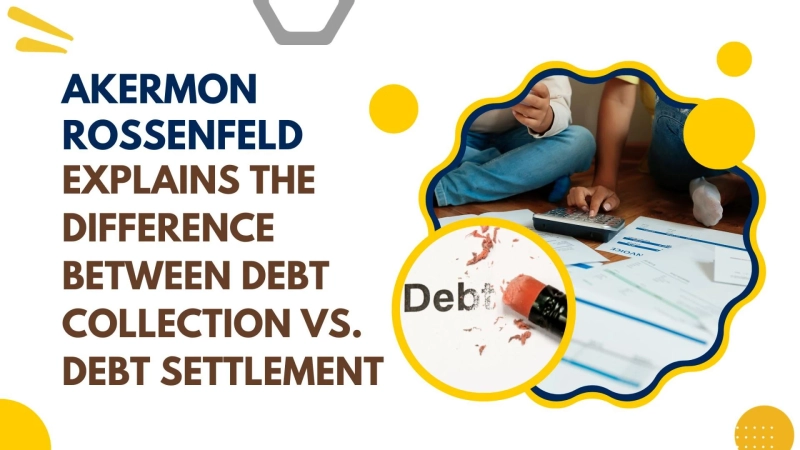In the world of financial management, debt-related problems are ubiquitous, and clients and companies alike regularly find themselves grappling with the complexities of managing debts. Akermon Rossenfeld, a reputable debt collection agency, stands at the forefront of helping individuals and organizations navigate these turbulent waters. One of the essential aspects of their service is clarifying the critical distinction between debt collection and debt settlement. Understanding this difference is vital for those seeking effective ways to manage their debts while maintaining their financial well-being.
Debt Collection: The Pursuit of Unpaid Debts
Debt collection is an essential step within the credit score lifecycle, and it regularly comes into play when a debtor fails to make scheduled bills on a loan or credit score duty. A debt collection agency, including Akermon Rossenfeld, serves as a middleman between creditors and debtors. The number one function of these agencies is to recover first-rate debts on behalf of the creditor.
Here's how the process normally works:
Initial Contact: When a debtor misses bills, the creditor might also hire a debt collection agency to pursue the unpaid debt. Akermon Rossenfeld's experienced crew reaches out to the debtor through smartphone calls, letters, or emails to speak about the wonderful debt.Verification of Debt: Debt collection agencies are required to offer the written word to the debtor, informing them of the quantity owed and the creditor's identification. This awareness allows debtors to validate the debt's accuracy.
Collection Efforts: Akermon Rossenfeld employs skilled negotiators who engage in chronic conversation with the debtor, aiming to gather the overall or a portion of the debt. Their procedures are fair and compliant with relevant guidelines.
Legal Action: In instances where negotiations fail and the debtor remains uncooperative, Akermon Rossenfeld may additionally advise a felony motion that may bring about salary garnishments, asset liens, or other measures to fulfill the debt.
Debt Settlement: Negotiating for a Debt Resolution
A debt agreement, on the other hand, includes negotiating with lenders to lessen the entire amount of debt owed. Akermon Rossenfeld recognizes that debt agreements are an alternative frequently taken into consideration by borrowers who are struggling to satisfy their economic obligations but wish to avoid the destructive outcomes of financial ruin.
Here's a top-level view of how debt settlement works:
Financial Hardship Assessment: Debtors paint with specialists, like Akermon Rossenfeld, who examine their monetary situation, considering income, prices, and the debt owed. This evaluation enables us to determine the debtor's ability to make a lump-sum charge to settle the debt.Negotiation with Creditors: Akermon Rossenfeld's skilled negotiators communicate with lenders to propose a discounted agreement amount. Creditors might also receive this offer in place of the entire debt quantity, spotting that receiving a partial charge is optimum to receiving nothing in the event of a financial disaster.
Lump-Sum Payment: If the creditor has the same opinion as the settlement offer, the debtor needs to make a one-time lump-sum fee to meet the reduced debt. Debtors need to have those budgets available while the agreement is reached.
Resolution of Debt: Upon receipt of the lump-sum charge, the creditor considers the debt resolved, and the debtor is now not obligated to pay the last balance.
Key Differences and Considerations
The primary distinction between debt Collection and debt agreements lies in their goals and approaches. Debt collection seeks to recover the full debt amount, potentially involving legal action, while debt settlement focuses on negotiating a reduced amount to resolve the debt more favorably.
When deliberating a way to address their debts, individuals and businesses need to not forget their monetary scenario and goals. Akermon Rossenfeld's knowledge of both debt collection and debt settlement permits them to offer comprehensive guidance, helping clients make knowledgeable selections that align with their unique situations.
In conclusion, Akermon Rossenfeld plays a pivotal role in helping debtors and creditors alike navigate the complexities of debt management. Understanding the differences between debt collection and debt settlement is crucial for anyone seeking a balanced and effective approach to resolving outstanding debts. By offering professional guidance and services tailored to individual needs, Akermon Rossenfeld stands as a beacon of support in the ever-evolving world of debt management.


